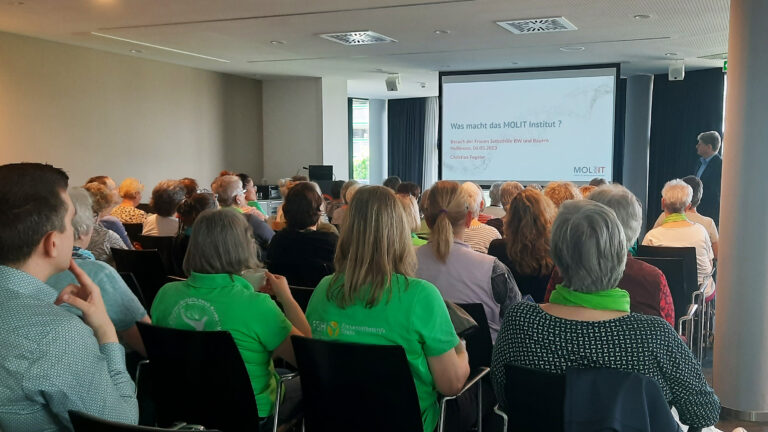On Saturday, May 6, 2023, the regional association of Frauenselbsthilfe Krebs (FSH) from Baden-Württemberg/Bavaria visited the MOLIT Institute for Personalized Medicine. Around 70 guests from various support groups in the Heilbronn-Franken region attended inspiring presentations and participated in interactive discussions on the topic of quality of life during and after cancer.
The event opened with an introductory talk by Prof. Dr. Fegeler, who presented the work of the MOLIT Institute and the role of “soft” artificial intelligence in improving standard medical care. He explained how AI is gaining importance not only in molecular diagnostics but also in clinical decision-making by analyzing large volumes of medical data—thus contributing to both individual treatment and the generation of new evidence and medical knowledge.
Participants then split into smaller groups to explore different thematic stations on basic research, knowledge management, and patient-generated data.
Dr. Jechlinger introduced the first group to current cancer research at the VISION Lab, focusing on the MiTi-SECC study and the role of the gut microbiome. The findings aim to improve early cancer detection and treatment outcomes.
Dr. Sigle, speaking on knowledge management, emphasized the importance of data donation for future research. The willingness to donate data is a valuable asset for answering emerging scientific questions. Knowledge derived from this data—and the resulting personalized models—also plays a crucial role in clinical decision-making.
In the third group, Ms. Beutter addressed quality of life across different phases of cancer. She highlighted its significance not only after diagnosis but also during rehabilitation and long-term survivorship. She also introduced the Lion App, which supports continuous quality-of-life documentation and helps patients and doctors maintain a transparent overview throughout the treatment journey.
FSH had already supported the development of the Lion App the previous year through active participation in focus groups and user testing. During this visit, guests were once again invited to participate and experienced a small interactive focus group session.
The discussion clearly showed how individualized life circumstances and well-being are becoming increasingly important in medicine.
The MOLIT Institute thanks FSH for their visit and the valuable exchange—and looks forward to future collaboration.
